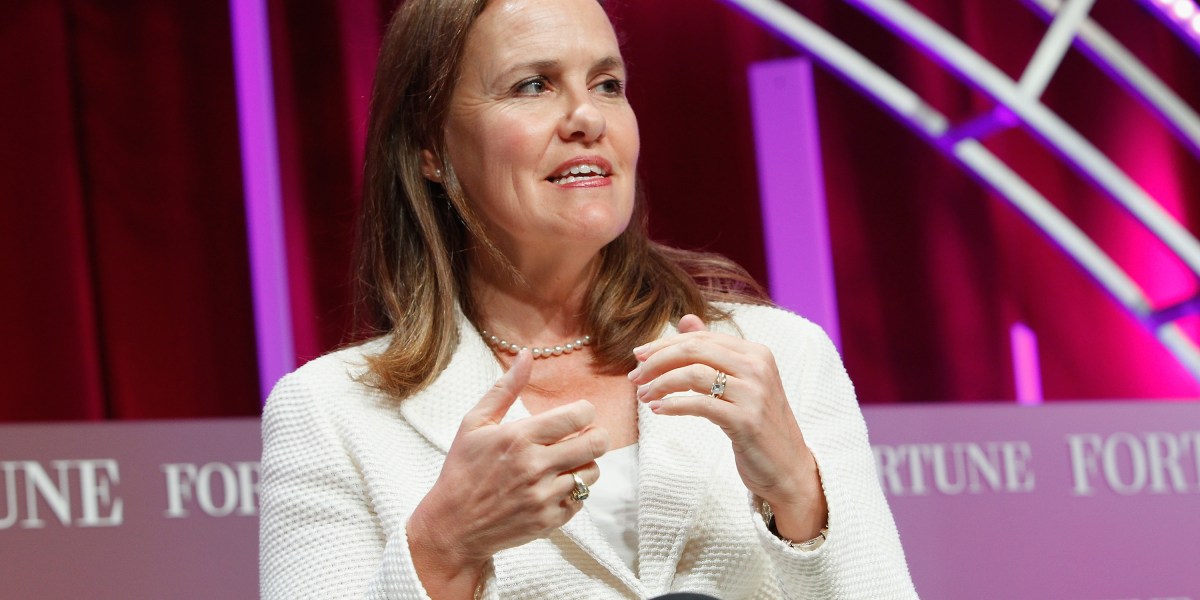In today’s edition: another Trump firing, the best moments from the U.S. Open, and Fortune’s Ellie Austin on how to handle geopolitical uncertainty—from a true expert.
– De-risking. Michèle Flournoy has spent much of her career advising presidents and CEOs. An esteemed defense policy expert, she served in the Pentagon, first under President Bill Clinton and then again under President Obama. In the latter’s administration, she was appointed the under secretary of defense for policy. At the time, it was the highest ranking Pentagon role that a woman had ever held.
In 2017, she cofounded a strategic advisory firm with a group of fellow former Obama administration officials, including Antony Blinken, who most recently served as secretary of state under President Biden (Blinken stepped back from the company when he returned to government.) The company, called WestExec Advisors in reference to West Executive Avenue, a secure road on White House grounds running between the West Wing and the Eisenhower Executive Office Building, describes itself as bipartisan and is staffed by senior national security professionals with experience at the highest echelons of government. Its mission? To help its clients (largely business leaders) navigate a suite of external factors such as geopolitical volatility, economic shifts and cyberthreats, via expertise gleaned from the years its employees spent around the White House Situation Room table in their previous lives.
Last week, Flournoy shared some of that expertise with the Fortune Most Powerful Women community during a members-only virtual meeting. I opened the call by asking her about President Zelensky’s recent visit to the White House, accompanied by a phalanx of European leaders, and how the business community should prepare for what comes next—whether it’s peace (hopefully) or otherwise—in the Russia-Ukraine conflict. Here is an excerpt from our conversation, edited for clarity and length.
Ellie: While this uncertainty between Russia and Ukraine rumbles on, how should leaders think about continuing to de-risk any operations they have in the region?
Michèle: The best advice I could give is to make sure you have access to geopolitical advice from experienced people who have been living these issues for decades. Tap into them, whether they’re on your team, your advisory board or whether they’re hired as consultants, so that you’re getting not just updates on events, but the most expert judgement to interpret those events as they unfold. Number two, if you have major business interests in the region, do some scenario-based contingency planning, looking at different outcomes. And if you have people and assets in the region, look at different ways of protecting them, should the worst occur.
I know you’re an advocate of tabletop emergency planning exercises, like the ones you were involved in when you were in the administration. What should those exercises look like?
At WestExec, we do this regularly with our biggest corporate clients. We’re currently doing a tiered series of cyber exercises for a Fortune 100 company, a technology company, which has got a tremendous CISO. But they’ve realized that they’ve never considered a cyber event that would materially impact the business. So we’ve been walking them through a series of escalating cyber scenarios where it would impact many key clients, then have a public dimension and a reputational risk dimension. It’s really a game about governance and decision-making under pressure in a crisis.
Ellie Austin
ellie.austin@fortune.com
The Most Powerful Women Daily newsletter is Fortune’s daily briefing for and about the women leading the business world. Subscribe here.
ALSO IN THE HEADLINES
Trump is firing a Fed official. Lisa Cook sits on the Federal Reserve’s Board of Governors and said she will fight the removal. New York Times
Is bachelorette culture out of hand? Some brands say being asked for free stuff for bachelorette parties is constant. Wall Street Journal
AMD’s stock is climbing today. Analysts say they see a new competitive edge for the chipmaker led by Lisa Su in its face-off with category leader Nvidia. MarketWatch
ON MY RADAR
Can women’s sport turn itself into big business? FT
What does it take to get men to see a doctor? New York Times
Planned Parenthood is getting involved in the redistricting battle The 19th*
PARTING WORDS
“Getting back on the court was about giving myself a chance to play more healthy. When you play unhealthy, it’s in your mind. It’s not just how you feel. You get stuck in your mind too. So it was nice to be freer.”
—Venus Williams on returning to professional tennis. She lost at Arthur Ashe stadium on Monday night.
